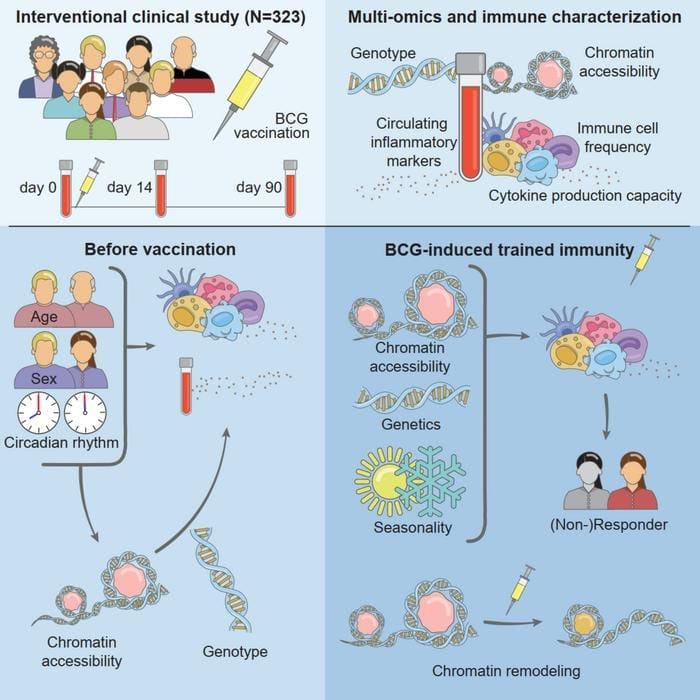Medicalfacts Editorial / Janine Budding January 10, 2024 – 6:41 PM
Bacillus Calmette-Guérin (BCG) is a vaccine against tuberculosis that surprisingly also reduces the risk of several other infections. This broader protection comes through a mechanism called trained immunity. However, the vaccine does not provide that broader protection for everyone. Mihai Netea, Christoph Bock and colleagues discovered that the epigenetic state of certain cells of the innate immune system predicts whether or not someone will benefit from that broader wake-up call. The discovery, published in Immunity, is important for future treatments that induce protective trained immunity.
Vaccine only trains dormant defenses
Inducing trained immunity through drugs or vaccines can protect during times of high risk of infection, for example after major surgery or during pandemics before specific vaccines are available. But trained immunity varies widely between individuals and it is not clear who may benefit from inducing trained immunity.
To investigate this problem, a team led by Mihai Netea (Radboudumc) and Christoph Bock (Medical University of Vienna) vaccinated 323 healthy volunteers with BCG and analyzed the effects on the immune system. They found that the trained immunity worked best in individuals with dormant innate immunity. This situation can be read from a characteristic epigenetic state of the cells and that state very accurately predicts the response to the vaccines.
The vaccine led to a response from the trained immune system in 213 people, and no response was found in 78 people. Those who responded to the vaccine had more dormant innate immune cells than those who did not respond. In short, the higher immune vigilance evoked in responders already exists in those who do not respond.
Epigenetic regulation of immune balance
Both genetic and environmental factors contribute to this variance, but the most interesting differences were observed in the epigenetic state of the immune cells. A cell’s epigenetic state – changes in chromatin that make genes easier or harder to activate – reflect a cell’s ability to respond quickly to changes in the environment. In this way, the trained immunity can be regulated. The researchers indeed saw this in both groups. The group that did not respond to the vaccination already had open, accessible chromatin on genes involved in innate immunity. The other group did not, but did develop it after vaccination. This explains how epigenetic changes allow immune cells to switch between different levels of vigilance. It is a mechanism that contributes to a good balance of the immune system; not overactive and not dozed off.
Stimulate dormant immune system to alertness
The results not only provide new insights into immune biology and the role of epigenetics, but also provide guidance for the development of future drugs. “We can imagine a new class of drugs that specifically wake up a dormant immune system,” says Netea. “In this way, elderly people could get a boost to their immune system before a planned hospital stay and perhaps we could reactivate the suppressed immune system in patients with cancer. Several pharmaceutical companies are already looking for ways to induce trained immunity without using the BCG vaccine.”
The new study provides important guidance for such efforts. For example, a better understanding of the biological pathways of trained immunity could reveal new therapeutic targets. Furthermore, the study shows that such agents are likely to be useful for individuals with dormant innate immunity, identified through chromatin profiling or functional immune testing. Also, no excessive immune responses were seen in people with high innate immunity prior to vaccination; a good omen for the safety of future immunity-inducing drugs.
Bock: “Our study highlights the close connection between epigenetic states of immune cells and trained immunity, which allows the human body to switch between alert and dormant innate immunity. This process varies from person to person and can be leveraged with precision medicine.”
Immunity: Multi-omics analysis of innate and adaptive responses to BCG vaccination reveals epigenetic cell states that predict trained immunity – Simone JCFM Moorlag, Lukas Folkman, Rob ter Horst, Thomas Krausgruber, Daniele Barreca, Linda C. Schuster, Victoria Fife, Vasiliki Matzaraki, Wenchao Li, Stephan Reichl, Vera P. Mourits, Valerie ACM Koeken, L. Charlotte J. de Bree, Helga Dijkstra, Heidi Lemmers, Bram van Cranenbroek, Esther van Rijssen, Hans JPM Koenen, Irma Joosten, Cheng-Jian Xu, Yang Li, Leo AB Joosten, Reinout van Crevel, Mihai G. Netea, Christoph Bock
https://doi.org/10.1016/j.immuni.2023.12.005
Editorial Medicalfacts / Janine Budding
I studied physiotherapy and health care business administration. I am also a registered independent client supporter and informal care broker. I have a lot of experience in various positions in healthcare, the social domain and the medical and pharmaceutical industries, nationally and internationally. And I have broad medical knowledge of most specialties in healthcare. And the healthcare laws from which healthcare is regulated and financed. I attend most of the leading medical conferences in Europe and America every year to keep my knowledge up to date and to keep up with the latest developments and innovations. I am currently doing a Masters in applied psychology.
My messages on this weblog do not reflect the strategy, policy or direction of an employer, nor are they work by or for a client or employer.
2024-01-10 17:43:37
#BCG #vaccine #strengthens #innate #immunity #people #dormant #immune #cells #MedicalFacts.nl


